
I mean, I would argue that the film is enough to make the case for the United States to start using the metric system. It would make going through a drive-through a lot more enjoyable, and would also give one a sense of class. Ordering a quarter-pounder with cheese sounds like I’m buying auto-parts or tanks of oil rather than a delicious cheeseburger. Whereas if I had to say I’d like a Royal with cheese? Come on America, it’s time. We can join the rest of the world already, and maybe at the same time we’re finally getting rid of day-light savings time?
I can dream.
 I write a lot on this blog about moments in my life that were moments of transitions, or else when I encountered a work of art which profoundly altered the course of my life. I recognize that this can be a bit frustrating for the reader who probably sees me now as a kind of Polly-Anna who can’t see a butterfly without undergoing a kind of spiritual and intellectual Eureaka moment. But I am honest, or at least try to be honest, when I write about the films and books and graphic novels that I read and enjoy whenever I write these essays and so I hope my reader believes me when I say that no film has ever so impacted my life as much as Pulp Fiction.
I write a lot on this blog about moments in my life that were moments of transitions, or else when I encountered a work of art which profoundly altered the course of my life. I recognize that this can be a bit frustrating for the reader who probably sees me now as a kind of Polly-Anna who can’t see a butterfly without undergoing a kind of spiritual and intellectual Eureaka moment. But I am honest, or at least try to be honest, when I write about the films and books and graphic novels that I read and enjoy whenever I write these essays and so I hope my reader believes me when I say that no film has ever so impacted my life as much as Pulp Fiction.
Along with Stephen King’s The Green Mile, the film was “given” to me by my sophomore high school English teacher Miss Tucker who told me I should see the film when I got the chance. The two of us would often talk before class about literature, art, film, and what we thought about such works. I admit completely without shame that I had a small “intellectual” crush on the woman, she was just really wise and smart and funny and I loved her. The conversations often dealt with Stephen King, and while I would gush about his prose, and too often about the violence in his works, she would ask me what I thought about the work as a whole and what I felt he was trying to do with the work. And somewhere, somewhere in all this dialogue, she told me that I needed to see a film entitled Pulp Fiction. I wrote the title down and hit my local Hastings grabbing up the film and watching it.
My first impression was the basement scene. Because, well, it’s the basement scene. But after that I found other elements of the film to appreciate.
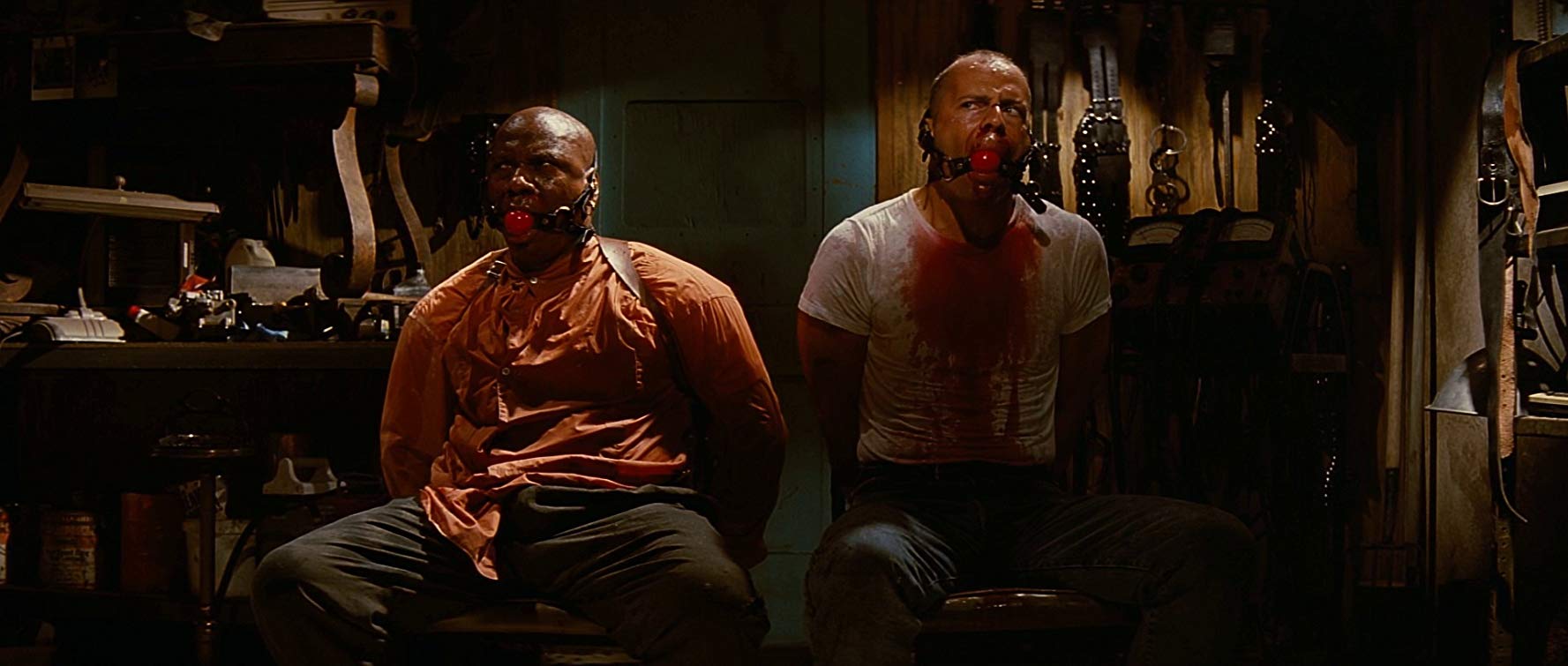
Pulp Fiction didn’t just take over my life, it totally consumed me, and so when my friend TJ was looking for films for the Movie-Group program at the library where we both work I suggested Pulp Fiction without hesitation. He said yes, and in April of this year I finally got to watch Pulp Fiction in an actual movie theater, though I suppose the word “watch” is a misnomer as I spent most of my time in the back row mouthing along to virtually every line of dialogue.
I’ve tried so many times to write about Pulp Fiction for this blog and every one of my efforts have ended either in disaster or abandonment. My problem stems from the fact that, if it hasn’t been made clear, I really love this film and there’s nothing more  obnoxious than listening to someone prattle endlessly on about why something is awesome. Passion, and conviction of passion is one thing, but somebody telling you that you NEED to see a film is galling. And especially with Pulp Fiction, a film I’ve now seen close to 30 times, I run the risk of letting my passion get ahead of me. I wanted to try and focus on at least one aspect of the film that felt important or significant and as I watched the film again I kept asking the same question: Do I still feel that Jules is a good person.
obnoxious than listening to someone prattle endlessly on about why something is awesome. Passion, and conviction of passion is one thing, but somebody telling you that you NEED to see a film is galling. And especially with Pulp Fiction, a film I’ve now seen close to 30 times, I run the risk of letting my passion get ahead of me. I wanted to try and focus on at least one aspect of the film that felt important or significant and as I watched the film again I kept asking the same question: Do I still feel that Jules is a good person.
More writers and critics and YouTube bloggers that you can swing a cat at have tackled Pulp Fiction and the dialogues of good and evil and so I don’t want to try to even tackle that conversation. Much like Citizen Kane or Vertigo before you even start to talk you have to acknowledge everyone who’s come before you, so when I write about Jules here I want to make absolutely clear I’m only writing about my own perception of the character and not anyone else’s.
Jules to me was always the heart of the film, or at least the intellectual center of it, and 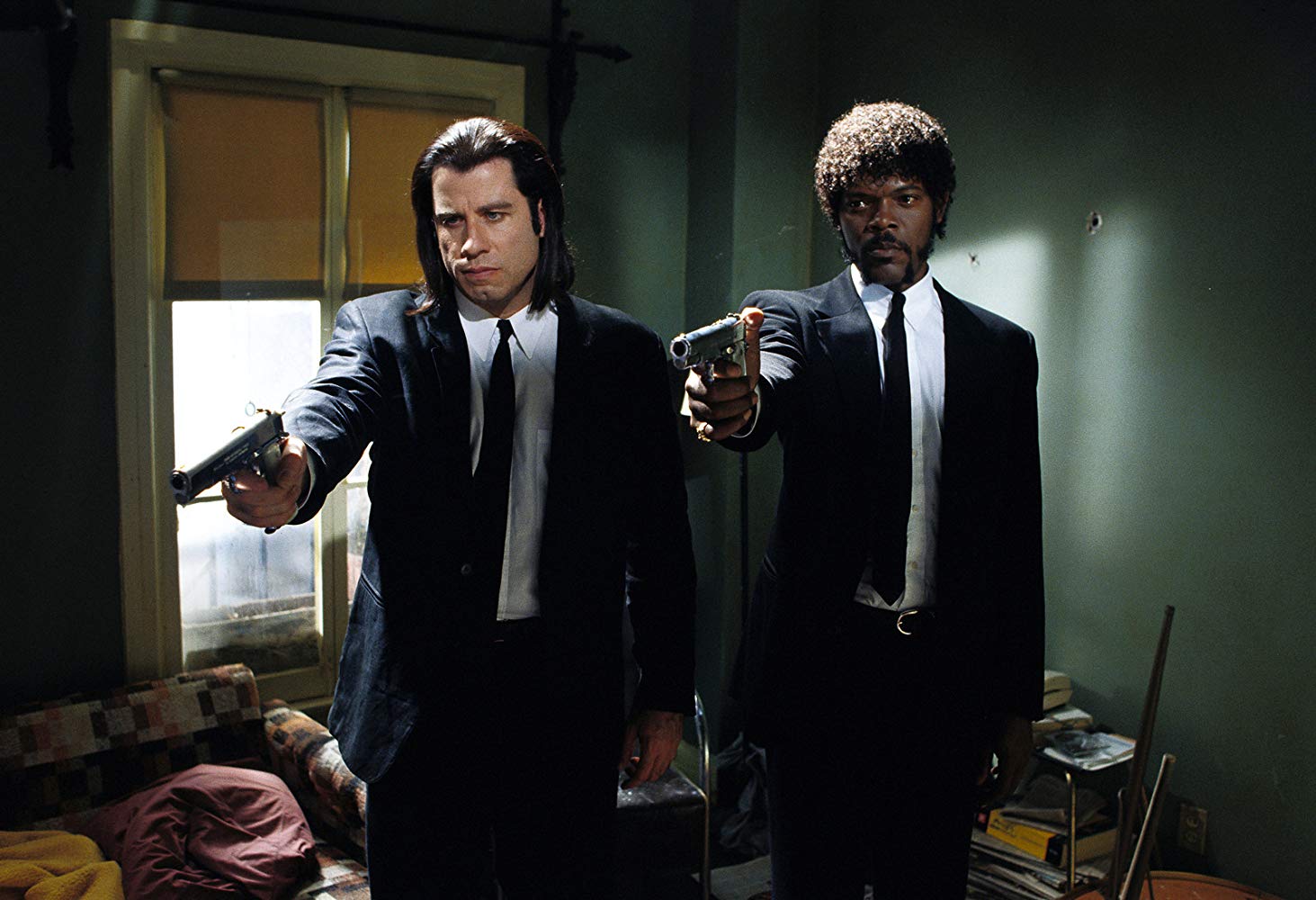 that never really changed. Even when I was young I would watch the film for Jules. Vincent was interesting, and I admit that I had a crush on Mia, and even Honey-Bunny and Ringo were somewhat interesting to me for their dialogue and choice to rob a restaurant, but even then their characters were secondary to Samual L. Jackson who just managed to steal the whole damn show.
that never really changed. Even when I was young I would watch the film for Jules. Vincent was interesting, and I admit that I had a crush on Mia, and even Honey-Bunny and Ringo were somewhat interesting to me for their dialogue and choice to rob a restaurant, but even then their characters were secondary to Samual L. Jackson who just managed to steal the whole damn show.
It doesn’t help that he has arguably some of the greatest lines in the entire film. Looking at just one scene one is able to feel the full force of his character.
Jules: You, flock of seagulls, you know why we’re here? Why don’t you tell my man Vincent where you got the shit hid at?
Marvin: It’s over th…
Jules: I don’t remember askin’ you a Goddamn thing! You were saying?
Roger: It’s in the cupboard.
[Vincent starts looking in the upper cupboard]
Roger: No, no, the one by your kn-knees.
Jules: We happy?
[Vincent continues staring at the briefcase’s contents]
Jules: Vincent! We happy?
Vincent: Yeah, we happy.
Brett: I’m sorry, I didn’t get your name. I got yours, Vincent, right? But I didn’t get yours…
Jules: My name’s Pitt. And your ass ain’t talkin’ your way out of this shit.
Brett: No, no, I just want you to know… I just want you to know how sorry we are that things got so fucked up with us and Mr. Wallace. We got into this thing with the best intentions and I never…
Jules: [Jules shoots the man on the couch] I’m sorry, did I break your concentration? I didn’t mean to do that. Please, continue, you were saying something about best intentions. What’s the matter? Oh, you were finished! Well, allow me to retort. What does Marsellus Wallace look like?
Brett: What?
Jules: What country are you from?
Brett: What? What? Wh – ?
Jules: “What” ain’t no country I’ve ever heard of. They speak English in  What?
What?
Brett: What?
Jules: English, motherfucker, do you speak it?
Brett: Yes! Yes!
Jules: Then you know what I’m sayin’!
Brett: Yes!
Jules: Describe what Marsellus Wallace looks like!
Brett: What?
Jules: Say ‘what’ again. Say ‘what’ again, I dare you, I double dare you motherfucker, say what one more Goddamn time!
The interrogation scene in the apartment with Brett has become more than just an incredible moment in cinema. Apart from becoming a meme, it has become a cultural staple that’s been parodied and plagiarized by comedians and artists for decades and, while the dialogue is incredible, it’s Jackson’s performance and delivery that makes the scene what it is. Jules appears all at once as a frightening and dangerous man who, up to this moment did not seem terrible ferocious. Or, put it another way, he seemed like an average every-day human being.
Pulp Fiction is incredible for making murderers, drug-dealers, gangsters, and criminals terribly human so that, while we’re watching them, we either see ourselves or people that we know. The set up to this scene is not two men discussing how they’re going to murder Brett and his friends in horrible way, nor is it bragging and boasting about the people they’ve killed in the past. Instead it’s two men, two friends almost, discussing hash bars, the differences between American and European culture, television pilots, foot massages, and finally taking the boss’s wife out on the town. And this last conversation only further humanizes these two men:
Jules: Why you so interested in the big man’s wife?
Vincent: He’s goin’ out of town, Florida. And he asked me if I’d take care of her while he’s gone.
Jules: [motioning a gun to the head] Take care of her?
Vincent: No, man. Just take her out. Show her a good time. Make sure she don’t get lonely.
Jules: You’re gonna be taking Mia Wallace out on a date?
Vincent: It is not a date. It’s just like if you were gonna take your buddy’s wife to a movie or somethin’. It’s just good company, that’s all.
[Jules looks at him as though to say, ‘Really?’]
Vincent: It’s not a date. It’s definitely not a date.
This commonplace attitude relaxes the viewer and gets them acclimated to Jules and Vincent, but watching the movie again I was struck by how subtle Jackson was in conveying the real threat of his presence. After these long conversations about seemingly mundane actions and realities, Jules enters the apartment and, if the reader pays attention they can see that his later actions are not so totally random.
After entering the apartment they watch Jules steadily build the tension:
Jules: Hey kids! How you boys doin’?
[to man laying on the couch]
Jules: Hey, keep chillin’. You know who we are? We’re associates of your business partner Marsellus Wallace. You do remember your business partner don’t you? Let me take a wild guess here. You’re Brett, right?
Brett: Yeah.
Jules: I thought so. You remember your business partner Marsellus Wallace, don’t you, Brett?
Brett: Yeah, yeah, I remember him.
Jules: Good. Looks like me an Vincent caught you boys at breakfast. Sorry about that. Whatcha havin’?
Brett: Hamburgers.
Jules: Hamburgers! The cornerstone of any nutritious breakfast. What kind of hamburgers?
Brett: Ch-cheeseburgers.
Jules: No, no no, where’d you get ’em? McDonalds? Wendy’s? Jack in the Box? Where?
Brett: Big Kahuna Burger.
Jules: Big Kahuna Burger. That’s that Hawaiian burger joint. I hear they got some tasty burgers. I ain’t never had one myself. How are they?
Brett: They’re good.
Jules: Mind if I try one of yours? This is yours here, right?
[Picks up burger and takes a bite]
Jules: Mmm-mmmm. That is a tasty burger. Vincent, ever have a Big Kahuna Burger?
[Vincent shakes his head]
Jules: Wanna bite? They’re real tasty.
Vincent: Ain’t hungry.
Jules: Well, if you like burgers give ’em a try sometime. I can’t usually get ’em myself because my girlfriend’s a vegitarian which pretty much makes me a vegitarian. But I do love the taste of a good burger. Mm-mm-mm. You know what they call a Quarter Pounder with cheese in France?
Brett: No.
Jules: Tell ’em, Vincent.
Vincent: A Royale with cheese.
Jules: A Royale with cheese! You know why they call it that?
Brett: Because of the metric system?
Jules: Check out the big brain on Brett! You’re a smart motherfucker. That’s right. The metric system. What’s in this?
Brett: Sprite.
Jules: Sprite, good. You mind if I have some of your tasty beverage to wash this down?
Brett: Go right ahead.
Jules: Ah, hit the spot.
Having spent now a good decade watching this film regularly I never really noticed this scene. It was just more filler before the violence, but watching it again I saw everything,. Jules doesn’t just enter in, act cool, and then shoot one of these men. Once he’s in the room he goes at these men aggressively. He doesn’t yell or scream at first, but he does show that he can do what he wants with them without fear or hesitation. I  wouldn’t let a stranger take a bite out of a cheeseburger I paid good money for, it’s my cheeseburger, and yet Jules asks for a bite knowing he’s going to pick it up anyway. And even while he’s chewing it he compliments them for having good taste before then grabbing Brett’s Sprite and drinking the entire soda.
wouldn’t let a stranger take a bite out of a cheeseburger I paid good money for, it’s my cheeseburger, and yet Jules asks for a bite knowing he’s going to pick it up anyway. And even while he’s chewing it he compliments them for having good taste before then grabbing Brett’s Sprite and drinking the entire soda.
It’s subtle, and something that I missed for ten years before I actually saw Jules for what he is: a violent person.
Now Jules does, many have argued, come to some kind of redemption by the end of the film, for not but a few seconds after this interaction he has a near-death experience that permanently alters his perspective, not just about his own life and actions, but existence overall. He decides that he’s done with crime, and in fact that he’s going to lead a life defined by pursuit of some new ideal:
Jules: Whether or not what we experienced was an According to Hoyle miracle is insignificant. What is significant is that I felt the touch of God. God got involved.
He then follows this up with:
Jules: I’ll just walk the earth.
Vincent: What’cha mean walk the earth?
Jules: You know, walk the earth, meet people… get into adventures. Like Caine from “Kung Fu.”
And then of course, the most infamous scene in Pulp Fiction apart from Marvin’s death, and the basement scene, and the adrenaline shot scene, and the dance at Jack Rabbit Slims, and the royal with cheese…okay, in arguably the most dramatic and character driven moment of the entire movie I should say, Jules delivers the most powerful lines in the film as he observes his own condition and address his desire for redemption:
Jules: I’m not giving you that money. I’m buying something from you. Wanna know what I’m buyin’ Ringo?
Pumpkin: What?
Jules: Your life. I’m givin’ you that money so I don’t have to kill your ass. You read the Bible?
Pumpkin: Not regularly.
Jules: There’s a passage I got memorized. Ezekiel 25:17. “The path of the righteous man is beset on all sides by the inequities of the selfish and the tyranny of evil men. Blessed is he who, in the name of charity and good will, shepherds the weak  through the valley of the darkness, for he is truly his brother’s keeper and the finder of lost children. And I will strike down upon thee with great vengeance and furious anger those who attempt to poison and destroy My brothers. And you will know I am the Lord when I lay My vengeance upon you.” Now… I been sayin’ that shit for years. And if you ever heard it, that meant your ass. You’d be dead right now. I never gave much thought to what it meant. I just thought it was a cold-blooded thing to say to a motherfucker before I popped a cap in his ass. But I saw some shit this mornin’ made me think twice. See, now I’m thinking: maybe it means you’re the evil man. And I’m the righteous man. And Mr. 9mm here… he’s the shepherd protecting my righteous ass in the valley of darkness. Or it could mean you’re the righteous man and I’m the shepherd and it’s the world that’s evil and selfish. And I’d like that. But that shit ain’t the truth. The truth is you’re the weak. And I’m the tyranny of evil men. But I’m tryin’, Ringo. I’m tryin’ real hard to be the shepherd.
through the valley of the darkness, for he is truly his brother’s keeper and the finder of lost children. And I will strike down upon thee with great vengeance and furious anger those who attempt to poison and destroy My brothers. And you will know I am the Lord when I lay My vengeance upon you.” Now… I been sayin’ that shit for years. And if you ever heard it, that meant your ass. You’d be dead right now. I never gave much thought to what it meant. I just thought it was a cold-blooded thing to say to a motherfucker before I popped a cap in his ass. But I saw some shit this mornin’ made me think twice. See, now I’m thinking: maybe it means you’re the evil man. And I’m the righteous man. And Mr. 9mm here… he’s the shepherd protecting my righteous ass in the valley of darkness. Or it could mean you’re the righteous man and I’m the shepherd and it’s the world that’s evil and selfish. And I’d like that. But that shit ain’t the truth. The truth is you’re the weak. And I’m the tyranny of evil men. But I’m tryin’, Ringo. I’m tryin’ real hard to be the shepherd.
Put aside the fact that Jules consistently misquotes the Bible (Eziekiel 25:17 doesn’t actually read this way) this moment has been dissected by film scholars, Tarantino Fans, and that one obnoxious dude who has “real evidence” that there’s a masonic conspiracy found in the “messages” of this movie all over the world. People gravitate to this 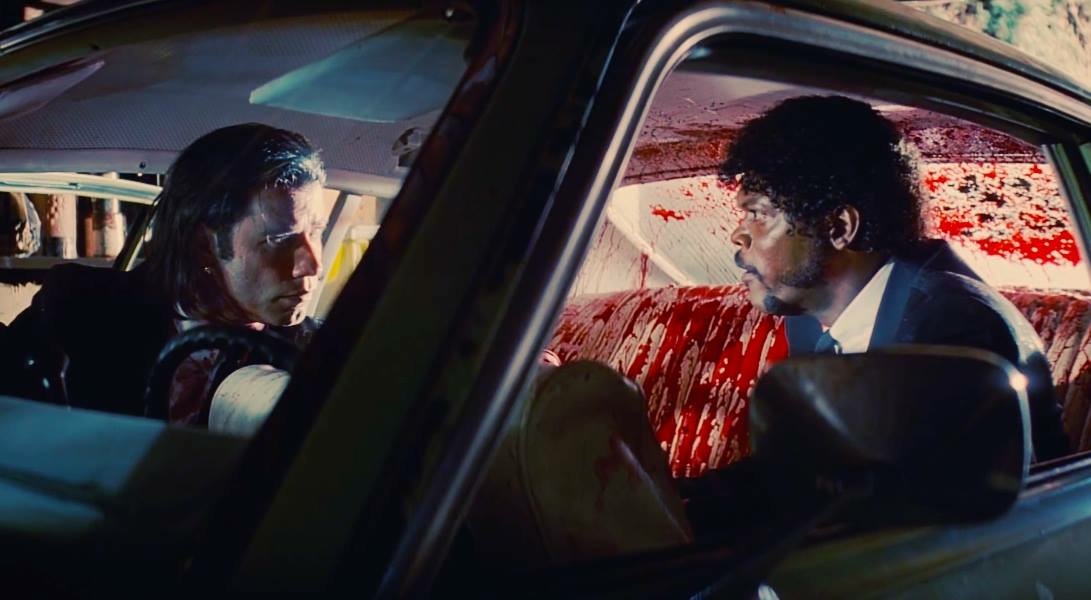 moment because, again, it’s the scene that has the most dramatic effect in terms of character in the film. Jules at this moment becomes the center of Tarantino’s film because he’s the first character who really seems to be trying to change and achieve redemption of some kind.
moment because, again, it’s the scene that has the most dramatic effect in terms of character in the film. Jules at this moment becomes the center of Tarantino’s film because he’s the first character who really seems to be trying to change and achieve redemption of some kind.
I’ve noted in previous essays that when I was a teenager gangsters and criminals really appealed to me in terms of my media consumption. Whether it was watching Goodfellas endlessly or memorizing almost every line of The Departed, movies about violent criminals appealed to me as I was trying to figure out who I was, what I wanted, and ultimately who I was going to be. Puberty is a bitch, and as I noted in my previous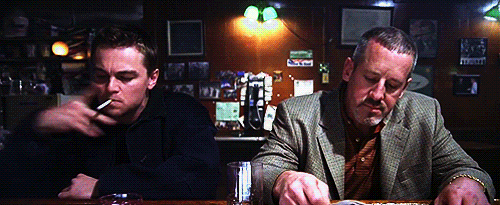 essays, I think what appealed to me about these characters, their lives, and their worlds, was that they were dark, and darkness even if it was vicarious felt satisfying. These men were taking control of their environment, and in the chaos and confusion of their existence they somehow managed to find control which was something I lacked.
essays, I think what appealed to me about these characters, their lives, and their worlds, was that they were dark, and darkness even if it was vicarious felt satisfying. These men were taking control of their environment, and in the chaos and confusion of their existence they somehow managed to find control which was something I lacked.
Pulp Fiction, in hindsight was different from these movies, because while these films ultimately revealed that such a life would ultimately lead to destruction, Tarantino offered the character of Jules who, despite the chaos around him, seems to find some kind of redemption by turning away from his life. And in some way I would argue that he does. His story ends when he delivers the glowing suitcase to his boss Marcellus Wallace which means that he ultimately escapes the chaos of a life of crime.
But at the same time watching the film again, I’m not in such a rush to defend Jules, or to argue that he totally redeems himself.
Jules is a criminal at the end of everything, and a man who has made a living stealing, killing, and hurting people, and even his “redemptive act” is still tainted by the fact that he allowed Honey-bunny and Ringo to leave with several of the other patrons’s money and goods. He himself notes that he’s not a decent sort of man but that he’s trying to be, and so while there has been an effort by many fans and critics to argue that Jules achieves redemption, in my view there really shouldn’t be a rush to argue for redemption. Instead if there is any virtue in Jules, it’s in realizing that that there isn’t a redemption, but choice.
Jules choses to alter his life and try to be a new person and that, ultimately, is the real sign of strength. 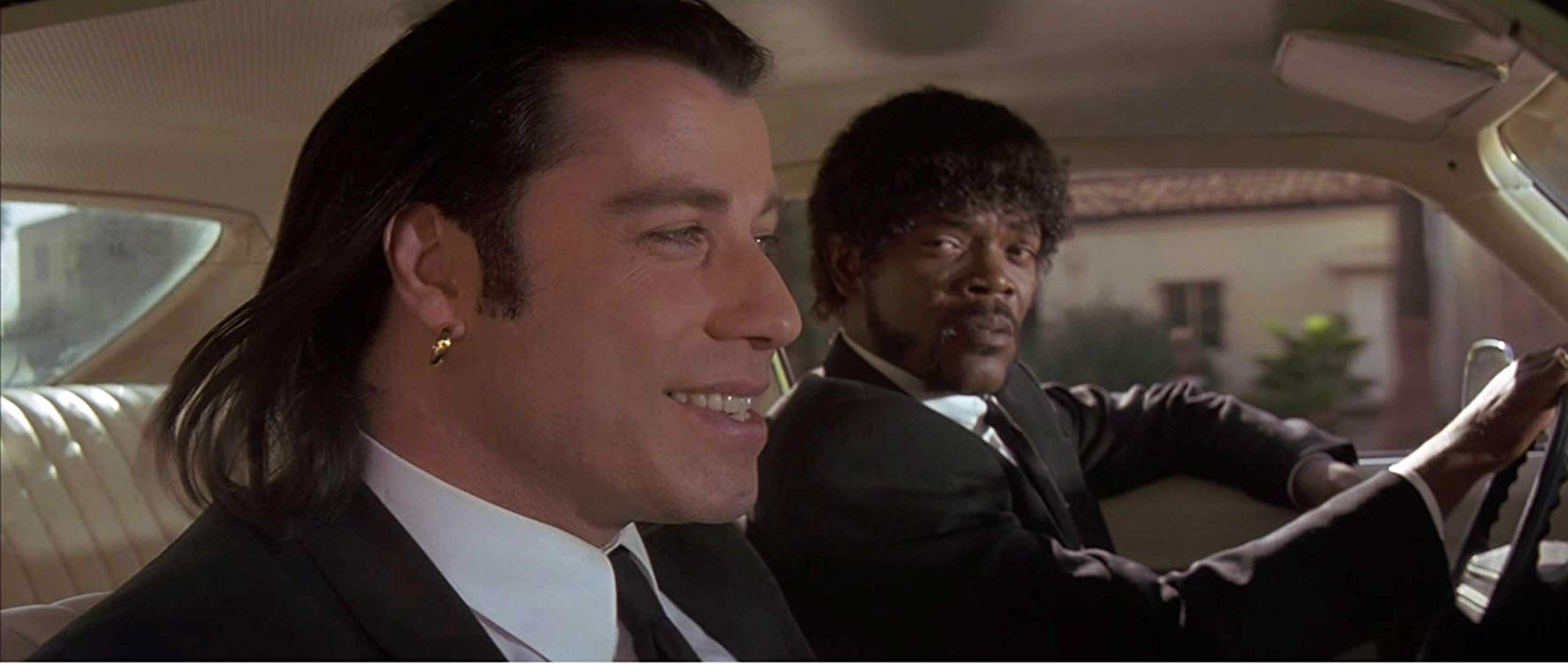
Having recently turned thirty, and having seen the choices I’ve made in life in this life to date, I’ve become more cognizant of my faults and mistakes in life, and I’ve tried to actively work on them. It doesn’t mean that I have totally and completely changed, and in fact I probably never will. There’s a sadness in this realization, but also a comfort. I make the choice to work on these faults and try to become a better man and friend and worker and human being, and that choice reveals a nuanced perspective of life that I recognized in Jules as I stood in the back of the movie theater watching Jules point that gun at the viewers, many of whom stayed and gave us one of the best nights we’ve had thus far with the movie group.
Life is not about achieving redemption and then being perfect. Life is more about the daily victories and choosing to try and be better, and so a longer and far more impactful lesson in Pulp Fiction this time around for me was not in looking for one moment that changed everything, but one choice.
It’s the choice to help Honey-Bunny and Ringo rather than just shoot them and get out of the restaurant that reveals that Jules as a man wants to try and be a better human being. It’s the choice of a young man who’s spent his life hating himself to try and find beauty in existence and to keep chugging coffee and hope that, if nothing else, some review he wrote about Pulp Fiction might finally generate enough political will to get Americans to start using the metric system.
It’s a long shot, but maybe one day I’ll finally pull up to a McDonalds and order a Royal with cheese with large fries. One can only hope.

*Writer’s Note*
All quotes cited from Pulp Fiction were provided by IMDb.com.
**Writer’s Note**
I’ve provided a few reviews of Pulp Fiction from the time it premiered originally in 1994, to a few more recent reviews. Hope you enjoy:
https://www.rogerebert.com/reviews/pulp-fiction-1994
https://www.nytimes.com/1994/09/23/movies/film-festival-review-pulp-fiction-quentin-tarantino-s-wild-ride-life-s-dangerous.html
https://www.theguardian.com/film/2014/may/15/pulp-fiction-review
https://www.vulture.com/2014/10/review-roundup-pulp-fiction-20-years.html
https://www.rollingstone.com/movies/movie-reviews/pulp-fiction-95345/
https://www.washingtonpost.com/news/arts-and-entertainment/wp/2014/10/17/pulp-fiction-is-20-years-old-read-the-washington-post-reviews-from-1994/?utm_term=.39fe358b949b

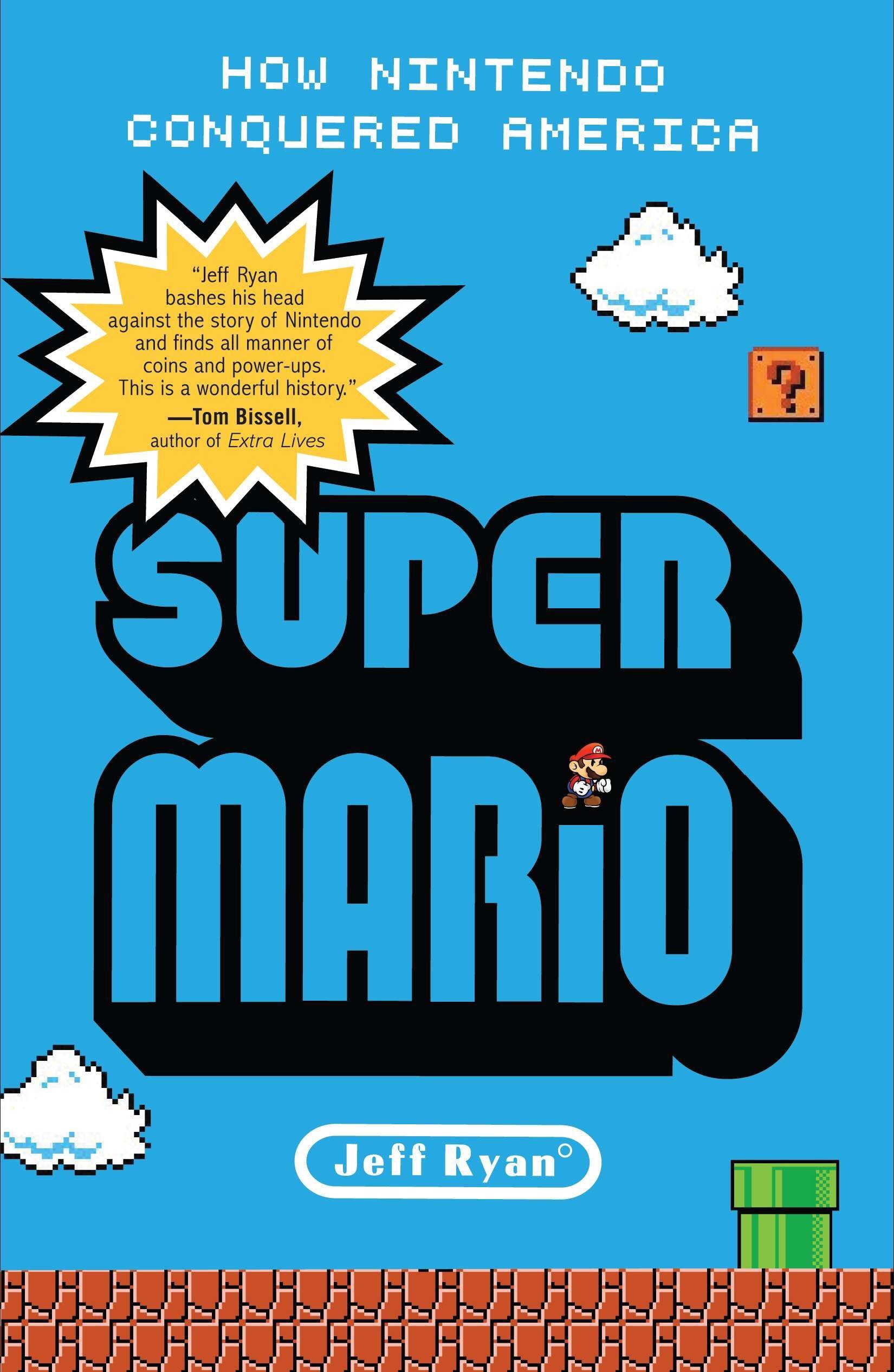




 period was in fact a fascinating time of change and growth of a new noble class of people’s who were trying to find some level of autonomy and government structure following the collapse of the Western Roman Empire.
period was in fact a fascinating time of change and growth of a new noble class of people’s who were trying to find some level of autonomy and government structure following the collapse of the Western Roman Empire.
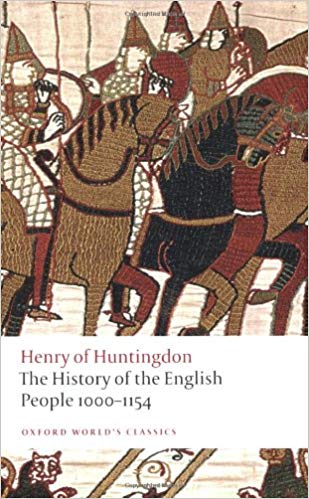 examples usually being The Histories by Herodotus, just about anything by Plutarch or Livy, or, in the case of this class, the work The History of the English People 1000-1154 by Henry of Huntington.
examples usually being The Histories by Herodotus, just about anything by Plutarch or Livy, or, in the case of this class, the work The History of the English People 1000-1154 by Henry of Huntington. rhetorical skills.
rhetorical skills.
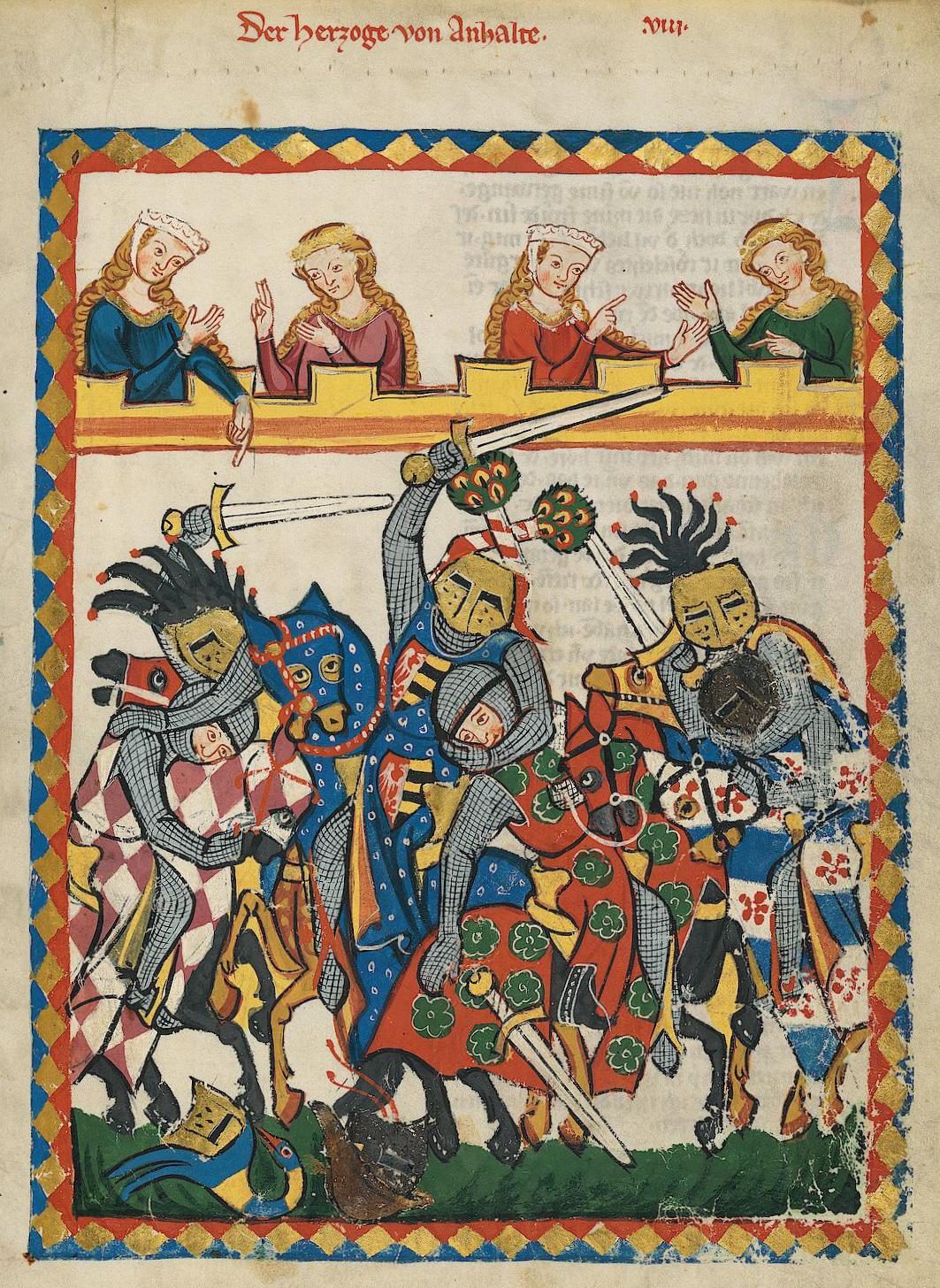
 all of which served as a distraction from the more important reality of the afterlife.
all of which served as a distraction from the more important reality of the afterlife. forbidden and long for what is refused.’ So this meal brought on a most destructive humor, and violently stimulated similar symptoms, producing a deadly chill in his aged body, and a sudden and extreme convulsion.
forbidden and long for what is refused.’ So this meal brought on a most destructive humor, and violently stimulated similar symptoms, producing a deadly chill in his aged body, and a sudden and extreme convulsion. of salt, and wrapped in oxides, to stop the strong pervasive stench, which was already causing three deaths of those who watched over it.
of salt, and wrapped in oxides, to stop the strong pervasive stench, which was already causing three deaths of those who watched over it.
 History is, like any and all of the studies of humanities, largely subjective.
History is, like any and all of the studies of humanities, largely subjective.




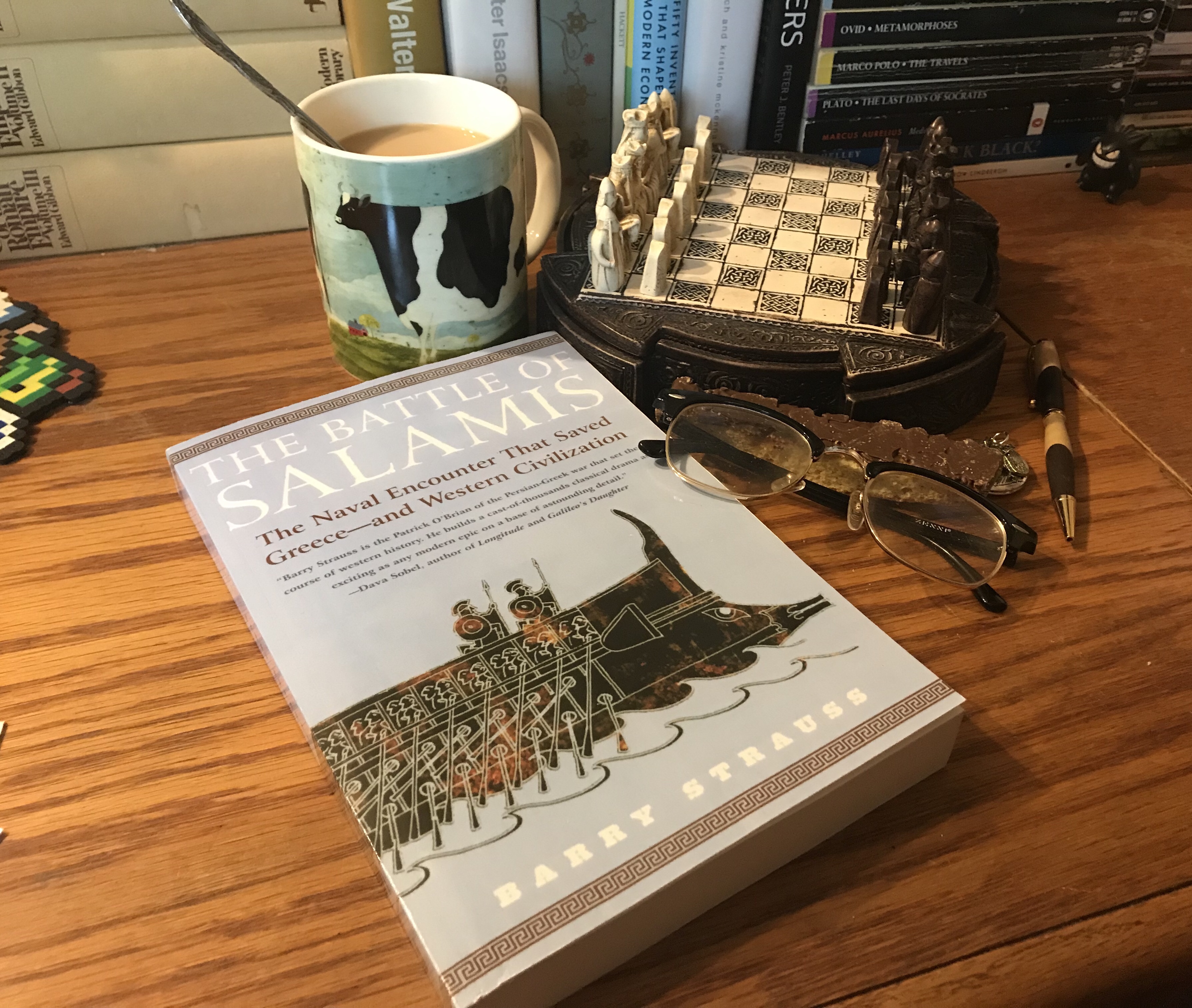

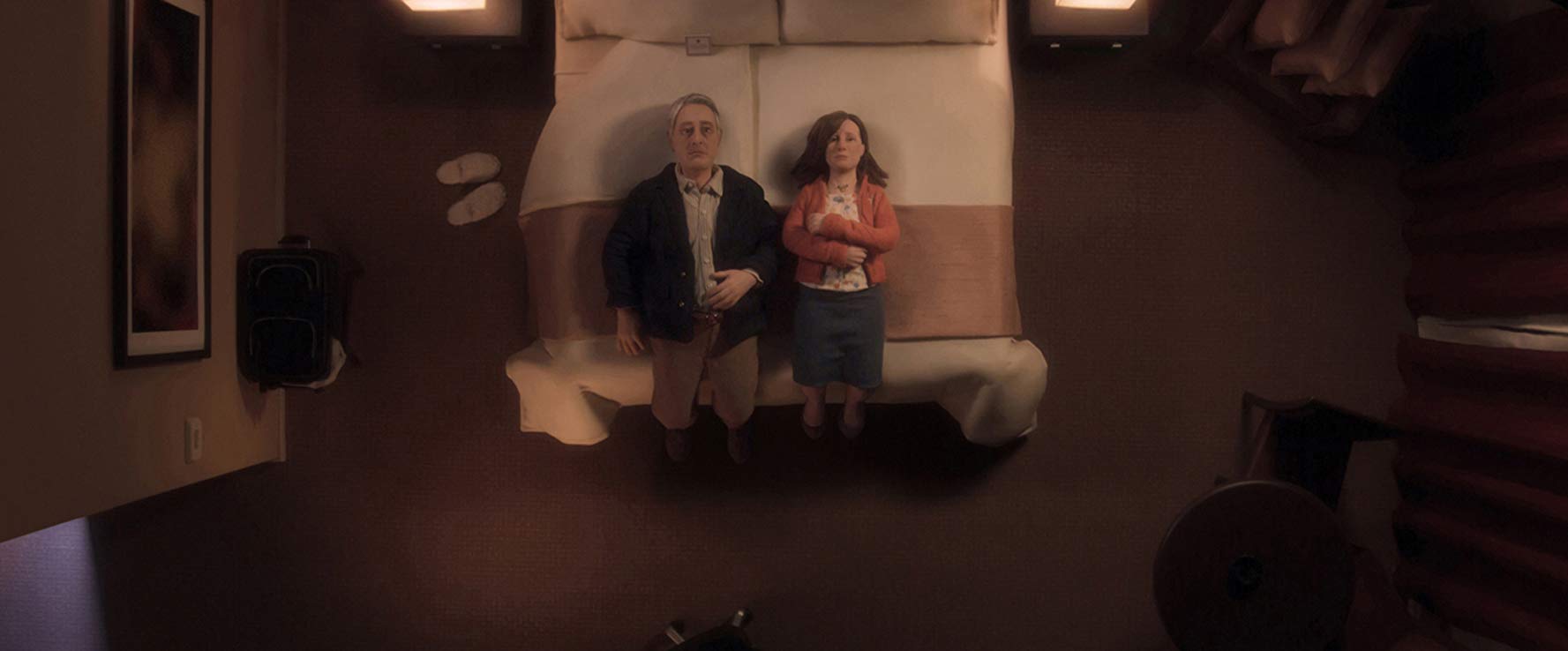



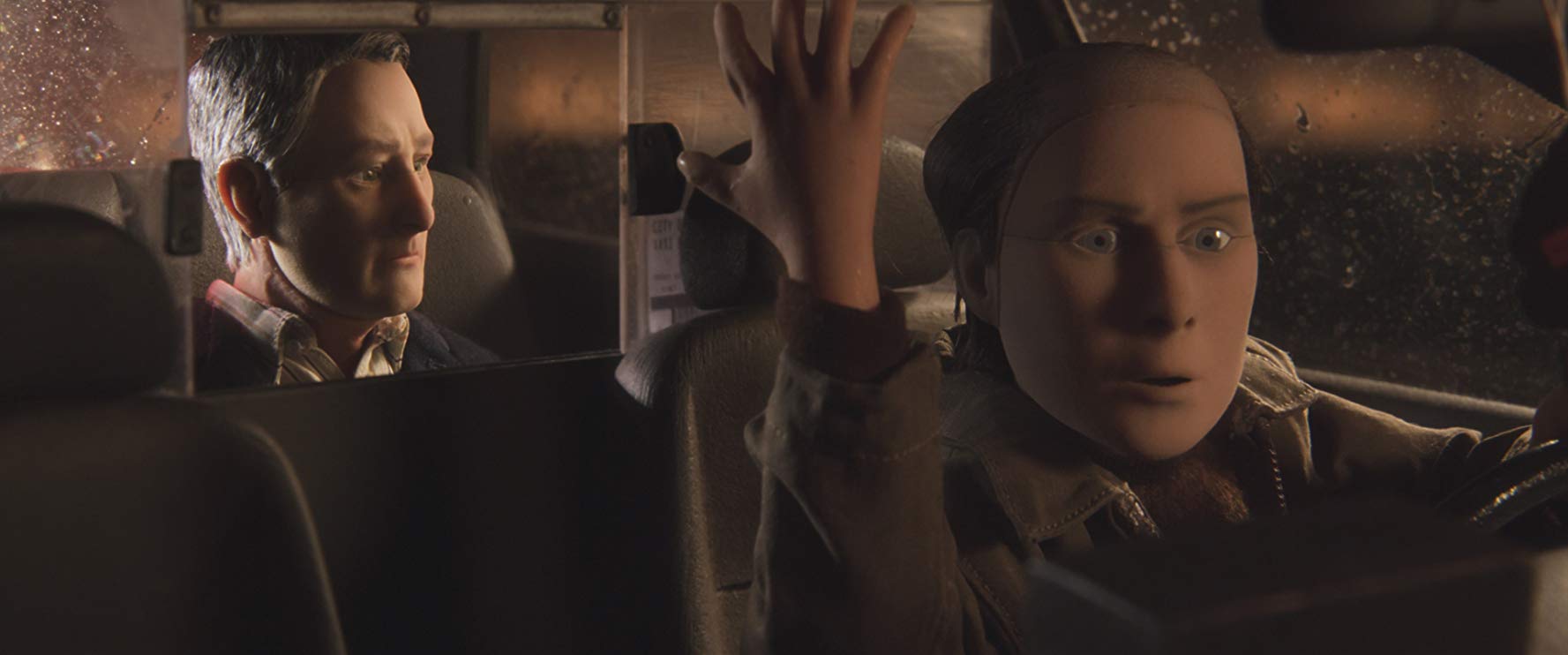

 the dolls are changed to show movement, at one Michael’s face literally coming off of his skull during one of the most disturbing dream sequences I’ve ever seen in my life.
the dolls are changed to show movement, at one Michael’s face literally coming off of his skull during one of the most disturbing dream sequences I’ve ever seen in my life.
 At this point my contester interrupts.
At this point my contester interrupts.

 drawers, the knick-knacks, the collectibles. Feel the weight as that adds up. Then you start adding larger stuff, clothes, table-top appliances, lamps, linens, your TV. The backpack should be getting pretty heavy now. And you go bigger. Your couch, bed, your kitchen table. Stuff it all in there. Your car, get it in there. Your home, whether it’s a studio apartment or a two bedroom house. I want you to stuff it all into that backpack. Now try to walk. It’s kind of hard, isn’t it? This is what we do to ourselves on a daily basis. We weigh ourselves down until we can’t even move. And make no mistake, moving is living. Now, I’m gonna set that backpack on fire. What do you want to take out of it? What do you want to take out of it? Photos? Photos are for people who can’t remember. Drink some ginkgo and let the photos burn. In fact, let everything burn and imagine waking up tomorrow with nothing. It’s kind of exhilarating, isn’t it? Now, this is gonna be a little difficult, so stay with me. You have a new backpack. Only this time, I want you to fill it with people. Start with casual acquaintances, friends of friends, folks around the office, and then you move into the people that you trust with your most intimate secrets. Your cousins, your aunts, your uncles, your brothers, your sisters, your parents and finally your husband, your wife, your boyfriend or your girlfriend. You get them into that backpack. And don’t worry. I’m not gonna ask you to light it on fire. Feel the weight of that bag. Make no mistake – your relationships are the heaviest
drawers, the knick-knacks, the collectibles. Feel the weight as that adds up. Then you start adding larger stuff, clothes, table-top appliances, lamps, linens, your TV. The backpack should be getting pretty heavy now. And you go bigger. Your couch, bed, your kitchen table. Stuff it all in there. Your car, get it in there. Your home, whether it’s a studio apartment or a two bedroom house. I want you to stuff it all into that backpack. Now try to walk. It’s kind of hard, isn’t it? This is what we do to ourselves on a daily basis. We weigh ourselves down until we can’t even move. And make no mistake, moving is living. Now, I’m gonna set that backpack on fire. What do you want to take out of it? What do you want to take out of it? Photos? Photos are for people who can’t remember. Drink some ginkgo and let the photos burn. In fact, let everything burn and imagine waking up tomorrow with nothing. It’s kind of exhilarating, isn’t it? Now, this is gonna be a little difficult, so stay with me. You have a new backpack. Only this time, I want you to fill it with people. Start with casual acquaintances, friends of friends, folks around the office, and then you move into the people that you trust with your most intimate secrets. Your cousins, your aunts, your uncles, your brothers, your sisters, your parents and finally your husband, your wife, your boyfriend or your girlfriend. You get them into that backpack. And don’t worry. I’m not gonna ask you to light it on fire. Feel the weight of that bag. Make no mistake – your relationships are the heaviest  components in your life. Do you feel the straps cutting into your shoulders? All those negotiations and arguments, and secrets and compromises. You don’t need to carry all that weight. Why don’t you set that bag down? Some animals were meant to carry each other, to live symbiotically for a lifetime – star crossed lovers, monogamous swans. We are not those animals. The slower we move, the faster we die. We are not swans. We’re sharks.
components in your life. Do you feel the straps cutting into your shoulders? All those negotiations and arguments, and secrets and compromises. You don’t need to carry all that weight. Why don’t you set that bag down? Some animals were meant to carry each other, to live symbiotically for a lifetime – star crossed lovers, monogamous swans. We are not those animals. The slower we move, the faster we die. We are not swans. We’re sharks. relationships I’ve developed and cultivated in my life, and I’ve noticed as well that, despite the fact that I have a great number of associations and acquaintances, I really don’t have that many close friends, and that’s largely been by design.
relationships I’ve developed and cultivated in my life, and I’ve noticed as well that, despite the fact that I have a great number of associations and acquaintances, I really don’t have that many close friends, and that’s largely been by design. other people, a condition that seems, as I observe and consume more and more media, not terribly uncommon.
other people, a condition that seems, as I observe and consume more and more media, not terribly uncommon.
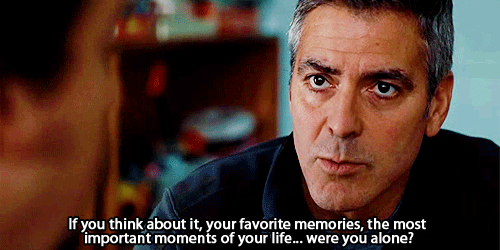 of change and yet seemingly bland uniformity.
of change and yet seemingly bland uniformity.


 I’ve ever read, watched or played.
I’ve ever read, watched or played.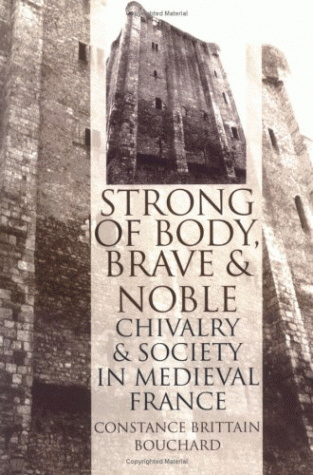 encountered other people who share this opinion and that collected sentiment builds towards larger understanding of the video-game series overall.
encountered other people who share this opinion and that collected sentiment builds towards larger understanding of the video-game series overall. 
 perception that many casual readers have experienced.
perception that many casual readers have experienced. historians who have come to the realization that feudalism, as a concept, is rather misguided and largely incorrect.
historians who have come to the realization that feudalism, as a concept, is rather misguided and largely incorrect.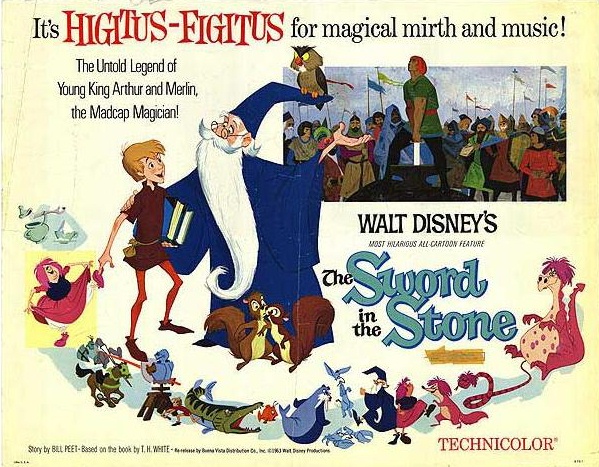
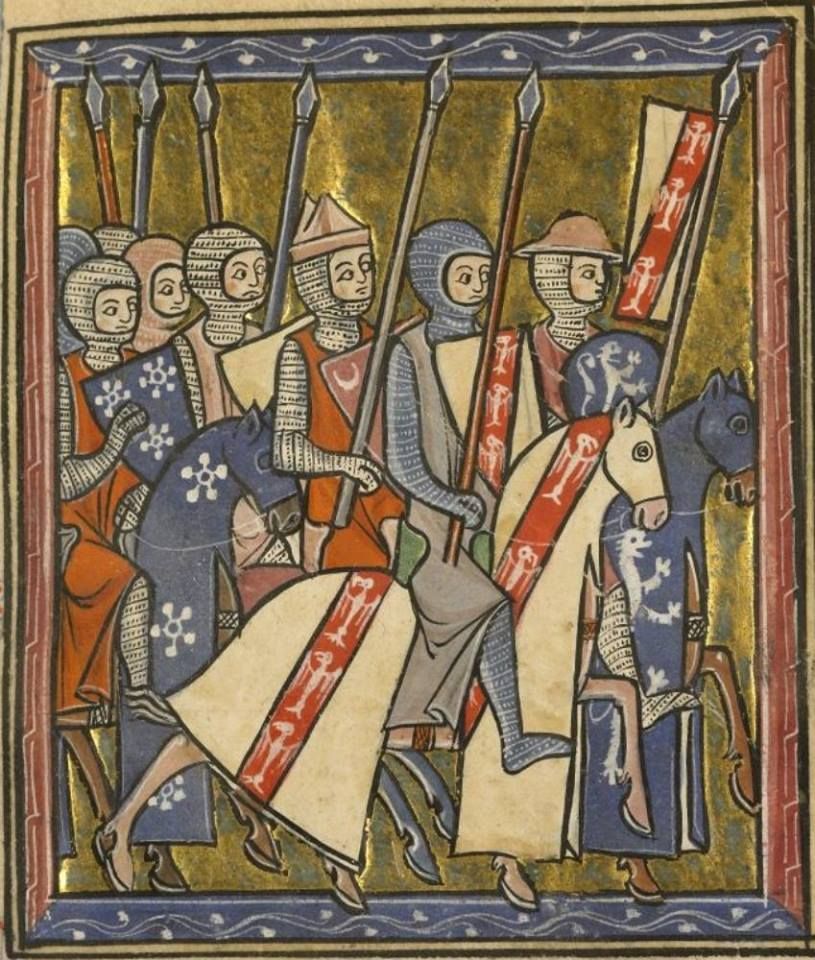 is the misconceptions of the Medieval period and the aristocracy.
is the misconceptions of the Medieval period and the aristocracy.
 development of a Noble class of people’s in France during the eleventh and twelfth centuries, Bouchard is able to address the issue that often narratives about a time period take hold in people’s mind and remain there despite the evidence to the contrary.
development of a Noble class of people’s in France during the eleventh and twelfth centuries, Bouchard is able to address the issue that often narratives about a time period take hold in people’s mind and remain there despite the evidence to the contrary. 
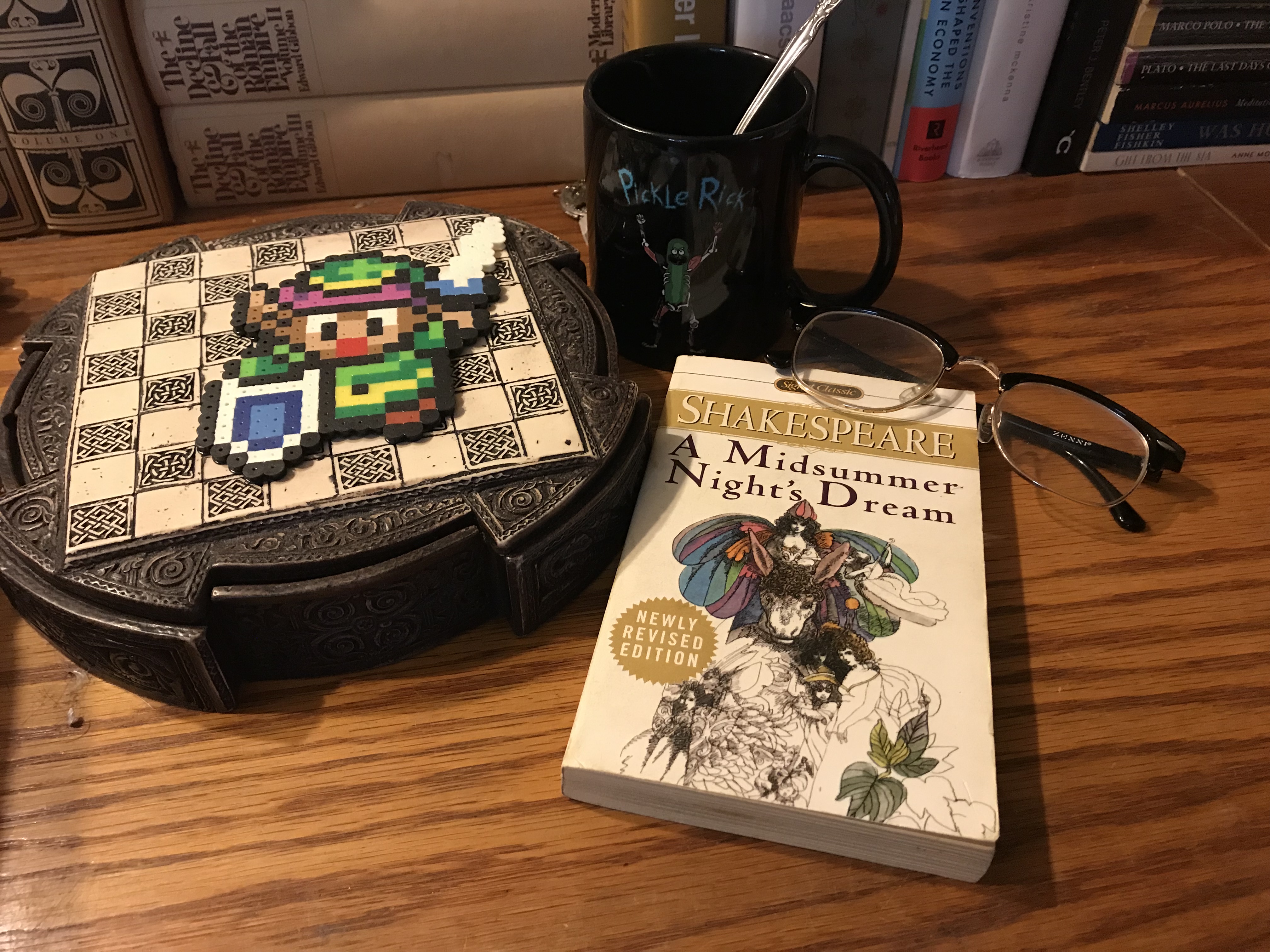

 I write a lot on this blog about moments in my life that were moments of transitions, or else when I encountered a work of art which profoundly altered the course of my life.
I write a lot on this blog about moments in my life that were moments of transitions, or else when I encountered a work of art which profoundly altered the course of my life.
 obnoxious than listening to someone prattle endlessly on about why something is awesome.
obnoxious than listening to someone prattle endlessly on about why something is awesome. that never really changed.
that never really changed.
 What?
What?



 wouldn’t let a stranger take a bite out of a cheeseburger I paid good money for, it’s my cheeseburger, and yet Jules asks for a bite
wouldn’t let a stranger take a bite out of a cheeseburger I paid good money for, it’s my cheeseburger, and yet Jules asks for a bite
 through the valley of the darkness, for he is truly his brother’s keeper and the finder of lost children. And I will strike down upon thee with great vengeance and furious anger those who attempt to poison and destroy My brothers. And you will know I am the Lord when I lay My vengeance upon you.” Now… I been sayin’ that shit for years. And if you ever heard it, that meant your ass. You’d be dead right now. I never gave much thought to what it meant. I just thought it was a cold-blooded thing to say to a motherfucker before I popped a cap in his ass. But I saw some shit this mornin’ made me think twice. See, now I’m thinking: maybe it means you’re the evil man. And I’m the righteous man. And Mr. 9mm here… he’s the shepherd protecting my righteous ass in the valley of darkness. Or it could mean you’re the righteous man and I’m the shepherd and it’s the world that’s evil and selfish. And I’d like that. But that shit ain’t the truth. The truth is you’re the weak. And I’m the tyranny of evil men. But I’m tryin’, Ringo. I’m tryin’ real hard to be the shepherd.
through the valley of the darkness, for he is truly his brother’s keeper and the finder of lost children. And I will strike down upon thee with great vengeance and furious anger those who attempt to poison and destroy My brothers. And you will know I am the Lord when I lay My vengeance upon you.” Now… I been sayin’ that shit for years. And if you ever heard it, that meant your ass. You’d be dead right now. I never gave much thought to what it meant. I just thought it was a cold-blooded thing to say to a motherfucker before I popped a cap in his ass. But I saw some shit this mornin’ made me think twice. See, now I’m thinking: maybe it means you’re the evil man. And I’m the righteous man. And Mr. 9mm here… he’s the shepherd protecting my righteous ass in the valley of darkness. Or it could mean you’re the righteous man and I’m the shepherd and it’s the world that’s evil and selfish. And I’d like that. But that shit ain’t the truth. The truth is you’re the weak. And I’m the tyranny of evil men. But I’m tryin’, Ringo. I’m tryin’ real hard to be the shepherd. moment because, again, it’s the scene that has the most dramatic effect in terms of character in the film.
moment because, again, it’s the scene that has the most dramatic effect in terms of character in the film. essays, I think what appealed to me about these characters, their lives, and their worlds, was that they were dark, and darkness even if it was vicarious felt satisfying.
essays, I think what appealed to me about these characters, their lives, and their worlds, was that they were dark, and darkness even if it was vicarious felt satisfying.


